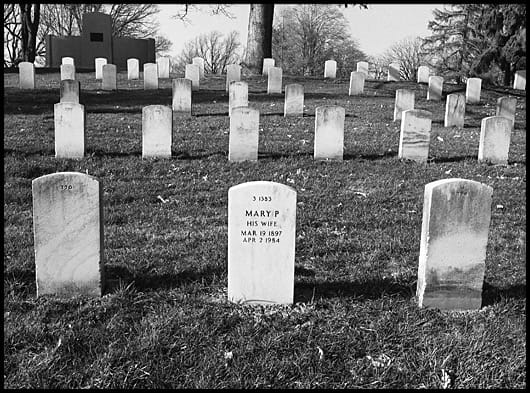24 Feb Mary P, His Wife

Jeff Gates, From a Series of One Acts… #2, 1986. Click on image for larger view.
One of my photographs is part of an exhibition opening this week at the Baltimore Museum of Art entitled Notes on Monumentality. The show “…reconsiders historic and contemporary conceptions of the monument and monumentality…” Through the work curator Mark Alice Durant asks “Can the idea of the monument continue in an era when social consensus no longer exists?”
The photograph above was taken in the national cemetery at Gettysburg. I was walking along the rows of soldiers’ tombstones when I turned and looked the other way to see this inscription on the back of a headstone. I thought it was a telling example of the way women are often conveyed in our society: as an appendage to their husbands. My wife and I were shocked a few years ago when at a reception after a museum talk I gave at another institution she was handed a name tag that said “Susie Krasnican Wife of Jeff Gates.” (The name tag still is pinned to our kitchen bulletin board.)
I didn’t realize my photograph was to be part of the show until I got an email from the museum’s rights and reproduction staff asking me to sign a non-exclusive license to use the image both on the show’s brochure cover as well as represent the exhibit as one of its key images. A key image is one that is used when the media requests a photo to accompany reviews or articles about the show. Working in an art museum myself I participate in meetings to pick key images for each of our exhibitions. So it was an added surprise to have my photograph used in this way.
If you’re in the Baltimore vicinity stop by and see the show. It’s up until May 25, 2008. And bring your husband.




steve
Posted at 15:46h, 24 FebruaryCongratulations. Looks like an intriguing show.
My students were discussing this question the other day –about the possibility for public monuments in an age of individuals. Too bad we aren’t closer to Baltimore.
Howard
Posted at 17:00h, 24 FebruaryJeff: This is terrific, congratulations. The photo is really mesmerizing. Mary P is the only stone (at least that I can see) with writing. Makes me wonder what other relatives are buried next to “him.”
Plan a field trip to B-more and I’m there!
Ivan Pope
Posted at 19:32h, 24 FebruaryHey, nice one Jeff. Lovely photo, great subject, perfect.
Gloria Chen
Posted at 03:22h, 26 FebruaryJeff, just curious, how did the curator come across a photo you’ve taken? Did you submit it or do you have a professional relationship with her? It’s a wonderful photograph; it has great context. Don’t get me wrong but most of the time when I visit museums I can’t help but wonder what makes a piece worthwhile for the public. In another word, as an art lover, am I persuaded to like certain art because it is hung high on a museum wall?
Jeff
Posted at 07:42h, 26 FebruaryGloria, good questions. My work is in the collection of the Baltimore Museum of Art and I believe the show contains works from their collection. As I mentioned, I didn’t know the photograph would be in the show until I got an email from the museum’s Rights and Reproductions department.
Now, onto the question of whether the value of an artwork is magnified by its visibility on a museum’s walls. Yes and no. Certainly, a work seen, whether it be on a museum wall, in a catalog, at auction, or in a review in the NY Times, enhances its value (more than just monetary). But does this make it “great” art? No.
Recently, I went to see the Snapshot show at the National Gallery of Art here in DC. Seeing anonymous snapshots, matted and framed on the gallery walls, made me look at these photographs differently. But, in the final analysis their value didn’t increase because they were on the wall. Rather, it was the image itself that ultimately made the difference.
Museum shows allow us to stop what were doing and “look.” I’ll be interested in seeing all the works in the exhibition to see how Durant ties them together and what, ultimately, they say about monuments in the early 21st century.